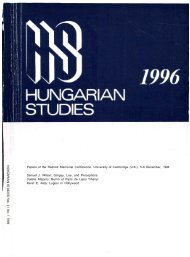The Canadian-American Review of Hungarian Studies - Vol. 4 ... - EPA
The Canadian-American Review of Hungarian Studies - Vol. 4 ... - EPA
The Canadian-American Review of Hungarian Studies - Vol. 4 ... - EPA
You also want an ePaper? Increase the reach of your titles
YUMPU automatically turns print PDFs into web optimized ePapers that Google loves.
temper such an indictment by recognizing that France "was not in aposition to effectively help the Polish economy" (41), that she "did notneed" Yugoslavian goods, and that she "was not in a position economicallyto help Hungary" (115)?To these complaints one is obliged to add two others. First, a conceptualproblem lies at the heart <strong>of</strong> this book. <strong>The</strong>re is no doubt at allthat we are in need <strong>of</strong> a work that investigates more closely the nature <strong>of</strong>France's relations with Central Europe; and this work does contributeto that cause. However, in order to appreciate such a topic fully, surelywe have to be told more about France's relations with the westernpowers, especially with Great Britain. Unless and until we are given thatsort <strong>of</strong> broad coverage, we are likely to be further plagued by suchjudgments as those which refer to the "questionable value" <strong>of</strong> a Britishalliance "as far as true French interests were concerned" (202).Second, this work prompts us to wonder where all the editors havegone. <strong>The</strong> reviewer has compiled a list <strong>of</strong> 42 printing and spelling errors,excluding those in the footnotes and bibliography and excluding 11cases <strong>of</strong> fait a compli (sic). One would think, too, that flaws <strong>of</strong> greatermagnitude required even less detection.. . . but in 1934, Germany also entered this group, while France movedinto the neutral block, which consisted <strong>of</strong> Poland, Switzerland, andEngland in 1933, and was joined by France in 1934. (68)Thus, while in 1933 Austria's foreign trade was fairly distributedamong the friendly . . . , hostile ..., and neutral... blocks, in 1934. (68)Finally, the translations are frequently awkward and unclear. Weencounter for example: 'A throughout pacifist state <strong>of</strong> mind preferredto believe. . .'(135); 'It will be easier... if Austria will have.. .'(178); theGerman minority was also "aggrevatcd (sic) by the arrogant and'politically not too psychological' attitude <strong>of</strong> the Czech bureaucracy..(186). And did Fichte really say that for any nation 'peace exists till herown frontiers are not invaded'(215)? If so, what in heaven's name couldhe have meant by it?This is not an impressive piece <strong>of</strong> work, except perhaps in itsdeficiencies. One would hope that for his next book the author willresist the understandable urge to rush to publication, and that he willfind himself a more meticulous and thorough publisher.University <strong>of</strong> WinnipegRobert J. Young
















